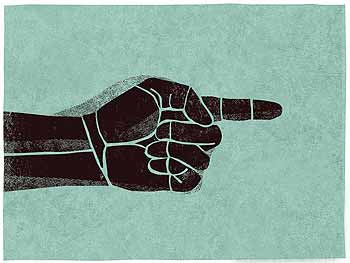 “When we point a finger at others, three fingers point back towards us. This means that before finding a fault with others, we should find three faults in ourselves.” – Radhanath Swami.
“When we point a finger at others, three fingers point back towards us. This means that before finding a fault with others, we should find three faults in ourselves.” – Radhanath Swami.
One young artist wanted to assess his skills. He put his best in painting a beautiful scenery and kept the painting at a busy street-crossing with the following message below it: “Since I’m new to this profession I might have committed some mistakes while painting; please put a cross wherever you see a mistake.”
When he returned after a few hours he was shocked to see crosses on all parts of his painting. Broken-hearted, he went to his teacher and wept about how people had rejected him completely. But the wise teacher consoled him and told him that actually his painting was flawless. He asked his pupil to paint the same scenery again. Again they kept the painting at the street-crossing. But this time, the message was different: “Since I’m new to this profession I might have committed some mistakes while painting. I have kept here a box with colors and brushes. Please do me a favor. If you see a mistake, kindly pick up the brush and correct it.” And guess what, no one made any corrections for the whole next month. It’s easy to find faults in others, but not so easy to help others improve.
Generally, when we associate with somebody for a long time, we start getting tired of him or her. Familiarity breeds contempt. That is human nature. The spouse starts getting on our nerves and we just start finding all sorts of faults. Quite often, our mind becomes occupied with minutely analyzing each fault in the other. But we should know that even we are full of faults, though we don’t want to admit it. Before finding a fault in the spouse, we should first find three within ourselves. If both spouses follow this rule, soon they will start appreciating how the other has accepted him or her with all the faults. In this mood, the spouses can cooperate and help each other diagnose faults in themselves and work together to cure them.
Any ordinary man can find faults with others, even if no fault exists. But it takes a great man to see the good in others, even if there’s only a little bit of it.


12 replies on “The Faulty Fault-Finder”
Any ordinary man can find fault in others even if no fault exists, but it takes a great man to see good in others even if there’s little bit of it. Very well said by Radhanath swami hope to remember these important things.
It is so wonderfully explained with a story that how we should look towards ourselves before pointing at others. This article really humbled me. Thank you so much
The last sentence is so beautiful, yet so difficult to practice. Thank you Swamiji.
Too true. Thank you for sharing such wonderful and practical advice with all of us.
Finding faults within can avoid finding faults with others, thinking others are better than me—is the noble quality. All glories to Radhanatha Swami.
Wow! its such a wonderful formula shared by Radhanath Swami to married couples so that they can stay united & cooperate with each other for a divine purpose.
Beautiful story. It is indeed difficult to help others improve. You really have to care to be able to do that.
Is there a problem if two or more people have the same thought?
Life will become really beautiful when we really learn to see good in others.. I hope to remember this always and put it in practice. Thank you swamiji.
Fault-Finding is a malice of the heart because of being unclean. By chanting the holy name offenselessly, we can overcome this mentality.
very true. We are always ready to find fault in others never in ourselves.
But it takes a great man to see the good in others, even if there’s only a little bit of it.
gREAT SAID, GREATER IF WE FOLLOW!!